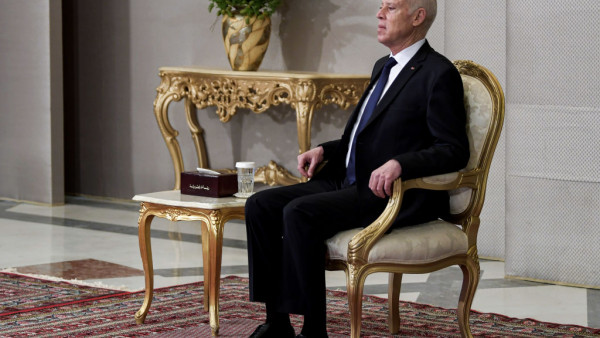“But I am not a stranger among my people,” said President Saied in his speech on Thursday, 25 July. [Getty]
On Wednesday, 24 July, Tunisian President Kais Saied decided to “pardon” his critics jailed on the anniversary of his self-coup, and just two months before a pivotal presidential election. He also strangely spoke of a ‘freemasonry’ conspiracy against the country.
“President Kais Saied signed a decree granting a special presidential pardon, which eliminates the punishment for several convicts who committed crimes related to social media posts,” the Tunisian presidency said in a statement on Wednesday evening, which involved 233 prisoners.
The statement clarified that the pardon does not extend to those convicted of other crimes.
The announcement coincided with the 67th anniversary of the declaration of the Tunisian Republic and the third anniversary of Saied’s exceptional measures on 25 July 2021, widely deemed a coup.
In his Republic Day speech, Saied also alluded to “betrayals, aligning with Zionism, and involvement in Masonic lodges in Tunisia.” The Tunisian president did not elaborate on these allegations but insisted, in his usual manner, “I know what I am talking about.”
In a more heartfelt tone, Saied likened himself to a prophet, saying he is “a stranger, like Salih among the Thamud… A stranger among those who were trusted and betrayed… A stranger to this system that has recently reformed and conspired.”
According to the Quranic story, God sent the prophet Salih to guide the people of Thamud back to the righteous path, but Thamud rejected Salih’s message and treated him as an outcast.
“(…) But I am not a stranger among my people,” he added in his speech on Thursday, 25 July.
Saied took office following free elections in 2019 but seized additional powers in July 2021 when he shut down the elected parliament and moved to rule by decree.
Since then, he has extended his grip on the country, including assuming authority over the judiciary in June 2022 and clamping down on criticism and opposition.
By February 2023, several political figures, activists, and media personalities critical of his regime had been arrested for “plotting against state security.”
In total, more than 60 people have been prosecuted under Decree 54 since its enactment, according to the National Union of Tunisian Journalists. Drafted to combat cybercrime, the decree’s broad terms like “fake news” and “harming state security” have drawn concerns from the UN Human Rights Committee and Human Rights Watch.
Two months before the presidential race, scheduled for 7 October, Saied’s most potential opponents are either in jail, facing trial, or disqualified.
His recent pardon came as surprising and contradictory to his long-standing denial of suppressing freedoms in the country.
“This [pardon] confirms that Tunisians have been prosecuted for their posts at a time when freedom of expression and opinion should be guaranteed by the constitution,” former judge Omar al-Sifaoui wrote in Al-Araby Al-Jadeed, the Arabic-language sister publication to The New Arab.
On Thursday, Tunis witnessed a face-off between the families of political prisoners protesting the shrinking freedom of speech under Saied and a small crowd chanting for the Tunisian president’s re-election.
The populist leader’s stardom waned significantly since his first election, as he has failed so far to end the cash-strapped country’s worsening food shortages, growing unemployment, and political turmoil.
The Party of the People, a steadfast supporter of Saied, has joined the presidential race in an unexpected move, which might signal Saied‘s crumbling support base or simply be the classic autocratic trick of introducing friendly faces as token opponents to maintain the illusion of competition in a one-man election.


